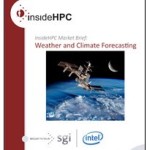The computational requirements for weather forecasting are driven by the need for higher resolution models for more accurate and extended forecasts. In addition, more physics and chemistry processes are included in the models so we can observe the very fine features of weather behavior. These models operate on 3D grids that encompass the globe. The closer the points on the grid are to each other, the more accurate the results.
insideHPC Special Report on HPC Weather Forecasting and Climate Research
In the pantheon of HPC grand challenges, weather forecasting and long term climate simulation rank right up there with the most complex and computationally demanding problems in astrophysics, aeronautics, fusion power, exotic materials, and earthquake prediction, to name just a few. This special reports looks at how HPC takes on the challenge of global weather forecasting and climate research.
Research Demands More Compute Power and Faster Storage for Complex Computational Applications
Many Universities, private research labs and government research agencies have begun using High Performance Computing (HPC) servers, compute accelerators and flash storage arrays to accelerate a wide array of research among disciplines in math, science and engineering. These labs utilize GPUs for parallel processing and flash memory for storing large datasets. Many universities have HPC labs that are available for students and researchers to share resources in order to analyze and store vast amounts of data more quickly.
This Week in HPC: DOE Labs Come Together on Climate and Latest Cuda Escalates ARMs Race
In this episode of This Week in HPC, Michael Feldman and Addison Snell from Intersect360 Research discuss the ACME collaboration for climate research. In Part 2, they look at the latest Cuda release with with support for 64-bit ARM processors.






